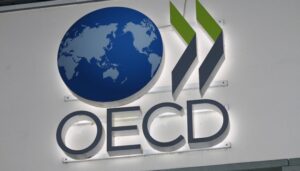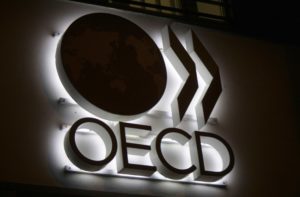
Invitation by the Organization for Economic Cooperation and Development (OECD) Working Group on combating bribery in Ukraine to join the Convention on Combating Bribery of Foreign Public Officials in International Business Transactions and become a full member of the relevant Working Group is recognition of the fact that Ukraine is clearly choosing a course of action to raise standards of transparency, accountability, and integrity in the interaction between business, civil society, and government.
This opinion was expressed to the Interfax-Ukraine agency by Oleksiy Shevchuk, chairman of the board of the National Association of Lobbyists of Ukraine.
“For us, as a professional community of lobbyists, the request from the Organization for Economic Cooperation and Development is an important signal: the state is clearly choosing a course of action to raise standards of transparency, accountability, and integrity in the interaction between business, civil society, and government,” he said.
Shevchuk noted that “in this context, the Association of Lobbyists of Ukraine believes that business, lobbyists, and state institutions should use this combination of two reforms—anti-corruption and lobbying—as an opportunity.”
According to Shevchuk, this refers, in particular, to the opportunity to create standards of professional ethics and conduct in the field of lobbying that will meet both the requirements of the law and the expectations of international partners, as well as the opportunity to review the internal policies of companies, “especially those operating abroad or in an international context, for compliance with the requirements of the Organization for Economic Cooperation and Development regarding the bribery of foreign officials.”
In addition, according to Shevchuk, such accession will “contribute to the new lobbying system becoming not only a platform for interests, but also a guarantor of good faith participation in state-building processes, creating trust in Ukraine among investors and international partners.”
“We believe that these changes should transform from a formal approach into an effective practical tool, and the Association is ready to facilitate training, code development, consultation, and monitoring. For Ukraine, this is a chance to increase competitiveness and demonstrate that we are capable of acting in accordance with the best international practices,” he said.
As reported, the Organization for Economic Cooperation and Development (OECD) Working Group on Bribery invited Ukraine to join the Convention on Combating Bribery of Foreign Public Officials in International Business Transactions and become a full member of the relevant Working Group. The basis for this process was draft law No. 11443, prepared by the parliamentary committee on law enforcement, on improving mechanisms for holding legal entities accountable for bribing foreign officials. In particular, the draft law provides for the possibility of applying special confiscation on the basis of a court decision to apply criminal law measures to a legal entity. According to the draft law, additional (non-financial) criminal law measures may be applied to a legal entity in the form of a temporary restriction on the activities of the legal entity or a temporary restriction on the acquisition of rights and/or benefits. The draft law also provides for an increase in the amount of fines imposed on legal entities as the main criminal law measure.

The Organization for Economic Cooperation and Development (OECD) Working Group on Bribery has invited Ukraine to join the Convention on Combating Bribery of Foreign Public Officials in International Business Transactions and become a full member of the relevant Working Group.
According to Serhiy Ionushas, a member of the Ukrainian parliament and chair of the parliamentary committee on law enforcement, the basis for this process was bill No. 11443, which was prepared by the committee and adopted by the Verkhovna Rada.
“Cooperation between Ukraine and the OECD is important for our country, because accession to the Convention will allow us to expand international cooperation in the investigation of corruption offences. In addition, it will strengthen Ukraine’s reputation as a reliable partner and at the same time contribute to attracting investment to our country. It is noteworthy that our partners have noted Ukraine’s significant progress in the fight against corruption and the implementation of the necessary anti-corruption mechanisms,” the politician said.
According to him, this was made possible, in particular, thanks to the coordinated work of the committee members with representatives of the working group under the President of Ukraine, led by the head of the President’s Office, Andriy Yermak, during the drafting of bill No. 11443.
“We have made serious efforts to ensure that Ukraine becomes a full member of the Organization for Economic Cooperation and Development’s Working Group on Bribery. And now the Committee continues to work in this direction, introducing international standards into domestic legislation,” Ionushas emphasized.
A total of 38 leading economies are members of the OECD. The organization already provides Ukraine with expert support and analytics.
As reported, on December 4, 2024, the Verkhovna Rada voted in favor of bill No. 11443 on improving mechanisms for holding legal entities accountable for bribing foreign officials. As noted in the explanatory note to the document, the law ensures Ukraine’s fulfillment of its obligations to implement the OECD Council’s recommendation on further combating bribery of foreign officials in international business transactions and introducing an effective mechanism for holding legal entities accountable, which will comply with the OECD Convention on Combating Bribery of Foreign Officials in International Business Transactions.
In particular, the bill provides for the possibility of applying special confiscation on the basis of a court decision to apply criminal law measures to a legal entity. According to the draft law, additional (non-financial) criminal law measures may be applied to a legal entity in the form of a temporary restriction on the activities of the legal entity or a temporary restriction on the acquisition of rights and/or benefits.
The draft law also provides for an increase in the amount of fines imposed on legal entities as the main criminal law measure.

Secretary General of the Organization for Economic Cooperation and Development (OECD) Matthias Korman has announced the opening of the OECD Office in Ukraine (Kyiv) on March 1.
“I can confirm that starting tomorrow, the official Office of our representative office in Kiev will open,” Korman said at a joint briefing with Ukrainian Prime Minister Denis Shmygal in Kiev on Tuesday.
The Secretary General thanked the Embassy of Slovakia for providing the premises for the Office.
He also thanked Poland, Romania, Latvia, Lithuania and Estonia for financially supporting the creation of this Office.
“Our Office staff will work with your government to develop a program for Ukraine within the OECD so that we can help you achieve all the priorities that are set in your government’s reform program according to OECD standards and principles as a future member of this organization,” Korman said.

The Organization for Economic Cooperation and Development (OECD) is opening a regional office in Ukraine, Ukrainian Prime Minister Denis Shmygal said.
“We have just concluded an agreement in Paris that officially gives grounds for launching the so-called “Liaison Office” of the Organization for Economic Cooperation and Development in Kiev. Since Ukraine is recognized as a potential OECD member, the office will tentatively operate until 2026 to support our country during the recovery,” Shmygal wrote in his telegram channel on Monday.
He said the OECD was a co-sponsor of the Marshall Plan and is now helping to develop Ukraine’s Recovery Plan.
“This month, we also received a description of the provisions of the OECD program, which will help to implement the Organization’s standards in various sectors. We are ready to start preparing it together so that we can join the “club of successful countries” as soon as possible. This will be a marker of Ukraine’s readiness to join the EU and will help establish the state as a regional leader,” Shmygal wrote.

The Organization for Economic Co-operation and Development (OECD) will open a dialogue with Ukraine on its accession following a request from Kyiv, OECD Secretary General Matthias Kormann said in a statement on Wednesday.
“After a request received from Prime Minister Denys Shmyhal to start the process of Ukraine’s accession to the OECD, the OECD Council decided to recognize Ukraine as a potential member of the organization,” it says.
Norman noted that after the completion of initial consultations on this issue, the OECD Council will consider opening discussions on accession and preparing a draft roadmap.

The Organisation for Economic Co-operation and Development (OECD) on Friday improved the assessment of Ukraine’s country risks, putting the country from the seventh to the sixth group of the classification of countries participated in the Arrangement on Officially Supported Export Credits.
“Of course, this is very small, but all the risks associated with Ukraine and Ukrainian companies are becoming less. This means lower insurance costs, lower loan rates, longer terms and limits of credit lines!” Deputy Minister of Economic Development, Trade and Agriculture, Trade Representative of Ukraine Taras Kachka said.
Along with Ukraine, Kosovo was transferred to the sixth group from the seventh, and Serbia from the fifth to the fourth.
At the same time, the OECD worsened the country risk assessment of a number of countries, in particular, Algeria and Oman was moved from the fourth group to the fifth, Tunisia from the fifth to the sixth, and Iran and Turkmenistan – from the sixth to the seventh.
In addition to Ukraine, the sixth group also includes countries such as Belarus, Georgia, Armenia, Uganda, Sri Lanka, Nigeria, and Mongolia.